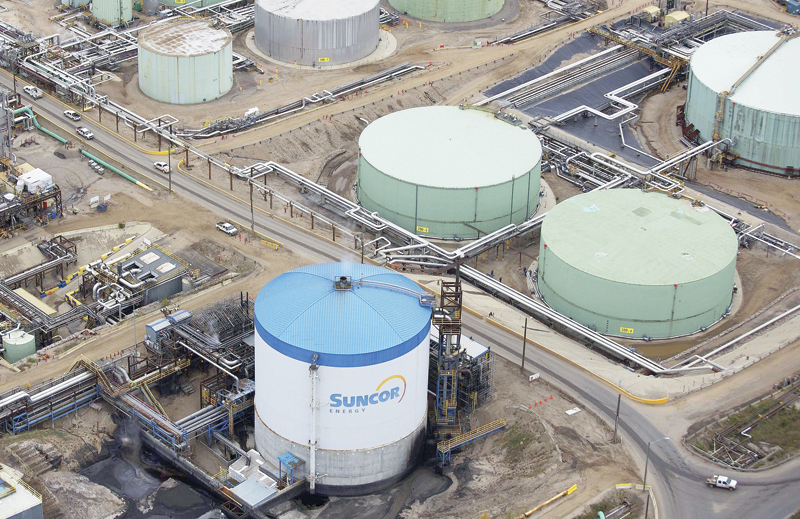

CALGARY: Years of low oil prices and high costs spurred a stampede by multinational majors out of Canada’s oil sands last year, leaving the remaining crude producers struggling to weather painful drops in profit. Environmentalists derided the “tar sands” as too dirty for investment, and analysts said the region’s high production costs made little sense in a world of $50-a-barrel oil.
But this month, global benchmark prices rebounded to $80 per barrel, cheering oil executives in the Canadian energy capital of Calgary, Alberta, who are shifting from survival mode to cautious expansion to capitalize on healthier cash flow expected this year.
Although most producers remain hesitant to commit substantial new capital, a few are restarting mothballed wells and many are pencilling out tentative plans for their extra cash as investors brighten their outlooks for the sector.
Plunging output from heavy-crude competitor Venezuela — amid a sprawling crisis in its socialist government’s state-run oil firm, PDVSA — adds further opportunity for sales of Canadian crude to US Gulf of Mexico refiners.
“It hurts on the downside, but boy is there opportunity on the way up,” said Ed LaFehr, chief executive of Baytex Energy Corp, which drills in Western Canada and Texas.
The improved prospects are already translating into job creation in an economy where the oil sands’ fortunes are so critical that the nation’s currency rises and falls in step with oil futures prices.
Matt Munro, Canada market manager for UK-based recruiter Petroplan, said the sector’s job postings have more than doubled so far this year compared with 2017 and salaries are up, particularly in oilfield services.
One company, for example, has boosted base salaries, before bonuses, from Cad$80,000 to adC$110,000 in the past 18 months, Munro said.
Average weekly salaries for oil and gas extraction workers in Alberta jumped 13.8 per cent from February 2017 to February 2018, according to the most recent available data from Statistics Canada.
The number of people employed by Alberta resource companies, meanwhile, jumped 6.8 per cent to nearly 106,000 in the same period, the data showed, though that is still well below the August 2014 peak of about 135,000 people.
Baytex delayed starting production on three wells in the first quarter but now plans to launch the wells this spring, LaFehr said.
The company’s hedging strategy could prevent it from reaping the full upside of higher prices this year.
But if prices hold it may see an extra Cad$200 million ($155.27 million) in free cash flow in 2019, which it could use to expand output and repay debt, LaFehr said.
Heavy oil producer BlackPearl Resources Inc shut down 10 wells in the first quarter that were not worth the expense of maintenance work at lower oil prices.
Now it’s restarting them to capture profits from the rebound. With US benchmark West Texas Intermediate crude prices up 13 per cent so far this year, BlackPearl CEO John Festival is mulling further expansion further next year.
“Higher prices certainly help the mood,” he said.
At current prices, BlackPearl might move more quickly to boost production at its Onion Lake, Saskatchewan project, which it had expected to expand by 6,000 barrels per day (bpd) in 2019, he said. Beyond those tentative steps, Festival will hold back on more substantial investments to see if market dynamics can sustain higher prices.
“One month of good prices is not enough to cause us to commit,” Festival said.
The recent upturn by no means solves the structural problems in Canada’s sector that were exposed when global prices crashed starting in 2014 from a height of more than $100 a barrel.
Oil sands drilling costs remain high, and Western Canada is still producing far more oil than its congested pipelines can deliver.
The oil-transport crisis is so severe, in fact, that many companies are shipping their oil one truckload at a time — at steep costs — for a lack of cheaper pipeline and rail options.
On Tuesday, the Canadian government announced it would take the drastic step of purchasing the Trans Mountain pipeline from Kinder Morgan Canada Ltd in a bid to rescue an expansion project facing fierce opposition in British Columbia.
High transportation costs translate into deep discounts on Western Canadian oil, relative to the US benchmark, with the gap reaching $30 a barrel in January, the biggest in four years.
That has since narrowed to as little as $13, but the reduction is mainly due to oil producers taking more maintenance downtime earlier in the year than planned, reducing the strain on pipelines. — Reuters
Oman Observer is now on the WhatsApp channel. Click here



